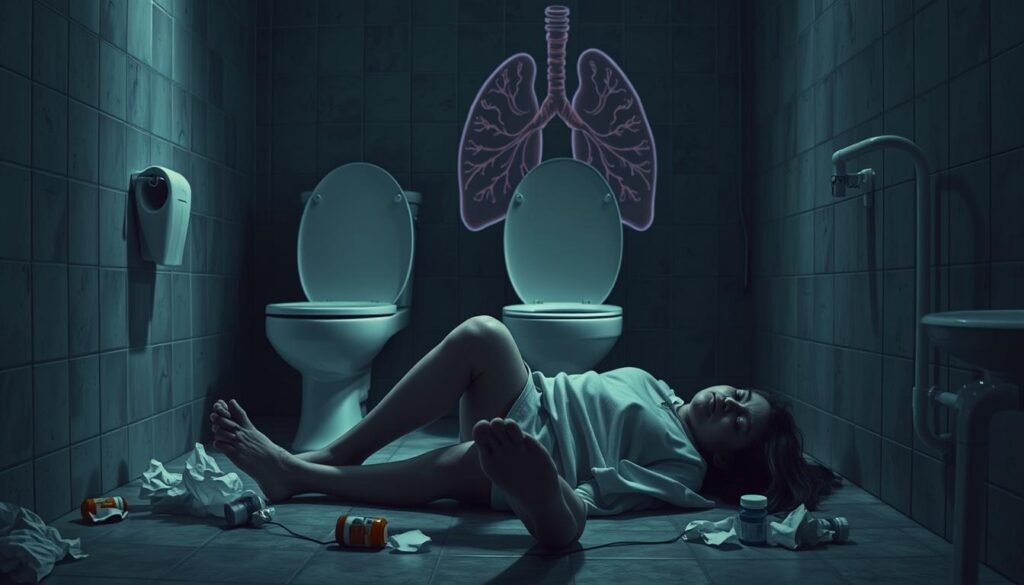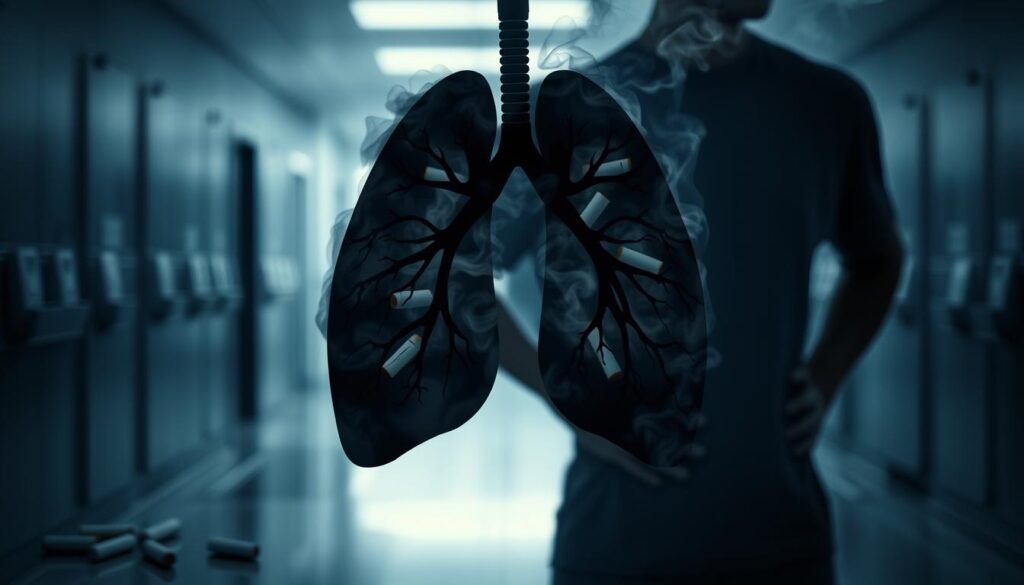Did you know about 40% of cancer patients face diarrhea from treatment or the cancer itself? This fact points out a big yet often overlooked problem among lung cancer patients. Recognizing how lung cancer connects to gut issues like diarrhea is key. It helps manage symptoms better and improves life quality.
Often, cancer treatments like chemotherapy and immunotherapy cause serious gut problems, making things worse for patients. And when lung cancer gets worse, it can weaken the immune system. This can make people more prone to upsetting symptoms. We will explore how lung cancer affects the body, leading to such gut issues. We’ll also highlight why noticing symptoms early is so important.
Key Takeaways
- Diarrhea affects approximately 40% of cancer patients.
- Gastrointestinal issues like diarrhea are significant in managing lung cancer symptoms.
- Cancer treatments often lead to severe diarrhea complications.
- Recognizing early symptoms is crucial for effective management.
- Lung cancer can increase susceptibility to infections that contribute to diarrhea.
Understanding Lung Cancer Symptoms
Lung cancer symptoms can often be hard to spot early on. Many people don’t notice signs until the cancer grows. However, early signs like a persistent cough, coughing up blood, and chest pain are important. These issues, along with weight loss and fatigue, could hint at a lung problem.
Shortness of breath and frequent infections also point to lung cancer’s effects. If the cancer spreads, it could cause bone pain or jaundice. Spotting these signs early can lead to quicker treatment and better chances of recovery.
Lung cancer might even affect your digestion, causing unexpected diarrhea. This shows how the sickness can weaken your body’s defense against infections. Symptoms can widely vary, highlighting the importance of watching your health closely.
Exploring Common Gastrointestinal Issues Related to Lung Cancer
Lung cancer can lead to a range of gastrointestinal issues that affect a patient’s life. Diarrhea is a common issue for those with lung cancer. They also might feel nausea, vomit, or have constipation. These problems can come from the cancer or its treatment. It’s key to handle these issues to help patients stay well.
Diarrhea is a big concern for cancer patients. It means having too much liquid in stools, happening more than three times a day. If diarrhea lasts more than four weeks, it can get dangerous. Between 20% and 70% of patients getting radiotherapy face diarrhea. Those having chemotherapy face similar rates. Knowing this shows why tracking symptoms is key during treatment.
The growth of lung cancer can lead to problems like constipation and diarrhea. Conditions like radiation enteritis are also an issue. Radiation enteritis is when the bowel doesn’t work right after radiation therapy. Medical pros must watch how treatments like painkillers can make constipation worse. To ease symptoms, patients might need to drink more water, eat more fiber, and move around more.
| Gastrointestinal Issue | Symptoms | Common Treatments |
|---|---|---|
| Diarrhea | Frequent, loose stools | Loperamide, opioids |
| Constipation | Infrequent, hard stools | Hydration, fiber supplements |
| Nausea | Feeling of sickness | Antiemetics, dietary changes |
| Vomiting | Expelling contents of the stomach | Antiemetics, hydration |
As treatments for lung cancer get better, knowing about gastrointestinal issues helps improve care. Focusing on the whole person – body and mind – is critical. This approach recognizes the link between gastrointestinal health and lung cancer.
The Relationship Between Lung Cancer and Diarrhea
Lung cancer and diarrhea are closely linked, though not always directly. Diarrhea often appears as a symptom during treatment. The immune system can be weakened by lung cancer. This makes patients prone to gastrointestinal issues.
Chronic diarrhea has been noted in lung cancer patients. One 57-year-old man suffered from diarrhea for three months. This was while he had a lung nodule. His condition briefly got better after surgery. But, it worsened after he started chemotherapy.
About 13.8% of lung cancer patients on immune checkpoint inhibitors get diarrhea. This shows the need to recognize cancer-related symptoms. Some patients’ diarrhea showed a collagenous pattern. Those with this symptom lived longer, showing a silver lining.
Modern care for lung cancer includes a team approach. Thanks to better diagnosis and care for symptoms like diarrhea, fewer patients are hospitalized. Such integrated healthcare methods boost patients’ treatment experience.
How Cancer Treatments Cause Diarrhea
Cancer treatments can affect your digestive system, leading to diarrhea. It’s key to know how different therapies cause this issue. This helps in managing it effectively.
Chemotherapy and Its Side Effects
Chemotherapy is well-known for causing stomach troubles, including diarrhea. Studies show that 50% to 80% of patients getting chemotherapy might face it. More than 30% can experience severe cases. Drugs like 5-fluorouracil, capecitabine, and irinotecan are especially likely to lead to this.
Irinotecan can cause diarrhea that’s immediate or delayed, no matter the dose. Risk factors like infections or past intestinal surgeries can make diarrhea more likely with these medications.
The Role of Radiation Therapy
Radiation therapy can harm the healthy parts of your intestines. This damage can lead to diarrhea. The effects vary based on where you get treatment and how much radiation you receive.
Those getting radiation should watch their gut symptoms closely. Damage from the therapy can make existing problems worse, especially in the belly area.
Immunotherapy and Targeted Treatment
Immunotherapy and targeted approaches add to the risk of diarrhea. They might change the gut’s natural balance or cause inflammation in the digestive tract. With immunotherapy, diarrhea might start weeks after beginning treatment.
Patients should be on the lookout for changes in their bowel habits. Using different treatment methods together might also raise the odds of getting diarrhea.

Managing Diarrhea During Oncology Treatment
It’s crucial to manage diarrhea well during cancer treatment. Cancer treatments come with many side effects, including diarrhea. Knowing how to handle this can make a big difference in your health and comfort. This part talks about staying hydrated, eating right, and knowing when to call a doctor.
Hydration: Importance and Tips
Keeping your body hydrated is key when dealing with diarrhea. This is especially true for patients getting chemotherapy or radiation. They need to drink plenty of fluids to avoid getting dehydrated. Health experts often recommend drinking at least 3 quarts of fluid each day, unless your doctor says otherwise. Good choices include:
- Water
- Clear broths
- Apple juice
- Ginger ale
- Sports drinks, like Gatorade
Not drinking enough can cause big health problems. So, it’s very important to keep an eye on how much you drink. Try sipping on drinks all day to keep your hydration up.
Dietary Adjustments to Alleviate Symptoms
The food you eat plays a big role in managing diarrhea. If you have diarrhea, eating a low-fiber diet might help. This causes less irritation in your gut. Things you can do include:
- Staying away from greasy and spicy foods
- Eating bland, low-fiber foods like bananas, rice, applesauce, and toast (BRAT diet)
- Avoiding dairy if it bothers you
- Having small meals more often
These changes can really help ease your symptoms and make you more comfortable during treatment.
When to Seek Medical Advice
Knowing when to get help from a doctor is important. You should call your healthcare provider if you:
- Have more than six watery bowel movements in two days
- See blood or strange stuff in your poop
- Lose 5 pounds or more since your diarrhea started
- Have really bad belly pain
- Keep having a fever
Spotting these signs and acting fast can prevent serious problems. Good diarrhea management can improve your life and help you with your cancer treatment.
| Fluid Type | Benefits |
|---|---|
| Water | Essential for hydration |
| Clear broth | Provides fluids and electrolytes |
| Apple juice | Gentle on the stomach |
| Ginger ale | May help soothe nausea |
| Sports drinks | Replenishes lost electrolytes |
Lung Cancer and Diarrhea: When To Be Concerned
If you have lung cancer, knowing when diarrhea is a serious issue is key. If it’s severe, you’ll need quick doctor help. Understanding this helps keep you healthy and enjoy life more.
Identifying Severe Symptoms
Patients and caregivers should keep an eye on bowel movements. Things like:
- More than six loose stools daily for over two days
- Presence of blood or mucus in the stool
- Significant weight loss linked to diarrhea
- A fever of 100.5 degrees Fahrenheit or higher
- Cramping and inability to control bowel movements
- Persistent diarrhea lasting more than 24 hours
- Accompanying symptoms like dizziness
Spotting these signs and telling doctors fast matter a lot. It can prevent dehydration and keep your body balanced.
Potential Implications of Chronic Diarrhea
Long-term diarrhea can deeply affect a patient’s life. It can cause:
- Weight loss and nutritional deficits
- Fatigue and lowered energy
- A higher risk for infections
- A pause in treatment due to health issues
Watching for long-term diarrhea signs during cancer treatment is vital. Acting early helps you stay healthier. For more on how high calcium levels impact your health, visit this resource.

Prevention Strategies to Minimize Diarrhea
To reduce diarrhea during cancer treatments, effective strategies are key. Knowing the side effects and choosing the right foods can boost gut health.
Staying Informed About Treatment Side Effects
It’s important for patients to know their treatment’s side effects. Spotting diarrhea early means they can adjust their diet or talk to doctors. This way, they can discuss any symptom changes better.
Maintaining a Balanced Diet During Treatment
Keeping a balanced diet helps fight off diarrhea and keeps you healthy. Eat soluble fiber foods like applesauce, bananas, and oatmeal for better digestion.
Small meals are best. Stay away from caffeine and spicy foods to avoid issues. Drinking plenty of fluids is essential to combat dehydration. Eat potassium-rich foods to maintain your levels.
The Importance of Palliative Care for Patients
Palliative care is key to better life quality for lung cancer patients. It helps manage symptoms and side effects from the disease and treatments. This care looks at the whole person, easing not just physical pain but also emotional and mental struggles.
People with lung cancer should meet with palliative care teams early on. These experts, like doctors and social workers, provide personalized symptom relief. This changes as the illness progresses. Studies show up to 96% of patients in advanced stages face pain, fatigue, or trouble breathing. Palliative care can greatly reduce these issues, improving how patients feel overall.
Palliative care isn’t just for the end of life. Talks about it should start before severe side effects appear. The support needed varies greatly between patients. It can range from relief for physical symptoms to emotional counseling. Many communities have palliative care centers, offering support in hospitals, clinics, or at home.
Early and effective palliative care leads to better outcomes. It’s a key part of the wider lung cancer treatment plan.
Palliative care teams are made up of different health experts. They work together for better symptom control. This team effort is crucial for the patient’s comfort and can also help them live longer. Pain and emotional stress reduction let patients stick to their treatment plans better.
In conclusion, adding palliative care to lung cancer treatment improves emotional and physical health. This care covers various symptoms. All patients should start discussing it early on, ensuring they get the right support through their treatment journey.
Early Detection of Lung Cancer: Can It Affect Diarrhea?
Finding lung cancer early can greatly improve health outcomes. It lets doctors use more focused treatments. These treatments can be less harsh, lowering side effects like diarrhea many see during care.
Knowing early signs of lung cancer is key for quick testing. A long-lasting cough, over two weeks, might signal lung cancer. Symptoms like sudden weight loss and trouble swallowing are also warning signs. People 50 to 80 years old, especially those who smoked a lot, should get checked regularly.
Studies found 34.1% of adults with lung or stomach cancer lost weight before knowing they were sick. This underlines early detection’s role, not just for lung cancer but for spotting other symptoms too. To learn more about important cancer symptoms, check out this resource on important cancer signs.
Being aware of early detection’s benefits can lead to better health and life quality. It also helps avoid problems like diarrhea from treatment. So, if you have any worrying symptoms, talk to your doctor right away.
Smokers: Understanding the Risks Beyond Lung Cancer
Smoking is much more dangerous than many people think. It’s not just lung cancer we’re talking about. About 80% of lung cancer deaths are because of smoking. This shows how serious smoking is. In 2022, there were around 236,740 new cases of lung cancer in the U.S. This shows the big impact smoking has on health.
Smokers also face big problems with their stomachs and intestines. For example, they’re more likely to have diarrhea. This is because smoking messes up the healthy bacteria in our guts. This bacteria is important for digestion. Unwanted changes, like those from smoking, can cause lots of stomach issues.
The lungs of smokers are also badly affected, beyond just cancer. Smoking makes it harder to treat lung cancer and other diseases. Clearly, smoking harms more than just the lungs. It can lead to serious stomach problems too.
It’s very important to deal with the health problems caused by smoking. Knowing about these risks can encourage people to stop smoking. Quitting can really improve someone’s life.

Conclusion
The link between lung cancer, stomach problems, and diarrhea is complex but very important. A big study showed that about 9.1% of patients treated with anti-PD-1 drugs get diarrhea. With anti-PD-L1 drugs, the number is slightly higher at 11.0%. While diarrhea is common, colitis is rarer but more serious. It happens in 0.9% of anti-PD-1 cases and 0.4% of anti-PD-L1 cases. This can lead to stopping the treatment.
Knowing these facts helps patients and their caregivers get ready for possible health issues. Things like drinking more water, eating different foods, and talking openly with doctors can help. This can make life better during treatment. Research says working with a team of health experts can improve how diarrhea and colitis are handled. This may result in fewer hospital visits for lung cancer patients.
To understand more about this, the study in the systematic review is very useful. With the right knowledge and support, patients dealing with lung cancer can manage stomach issues better during their treatment journey.